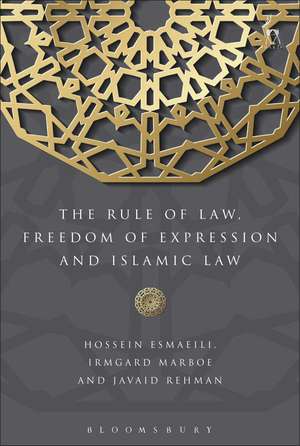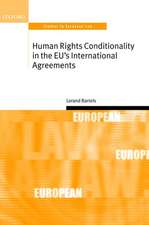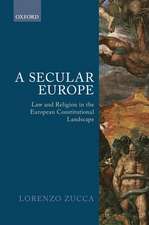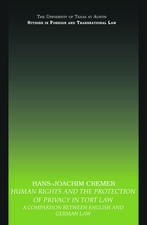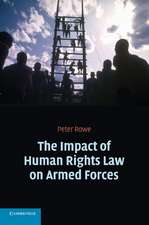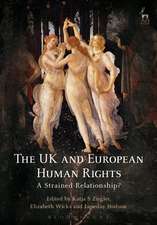The Rule of Law, Freedom of Expression and Islamic Law
Autor Professor Hossein Esmaeili, Irmgard Marboe, Professor Javaid Rehmanen Limba Engleză Paperback – 29 apr 2020
| Toate formatele și edițiile | Preț | Express |
|---|---|---|
| Paperback (1) | 272.14 lei 6-8 săpt. | |
| Bloomsbury Publishing – 29 apr 2020 | 272.14 lei 6-8 săpt. | |
| Hardback (1) | 571.24 lei 6-8 săpt. | |
| Bloomsbury Publishing – 13 dec 2017 | 571.24 lei 6-8 săpt. |
Preț: 272.14 lei
Preț vechi: 348.89 lei
-22% Nou
Puncte Express: 408
Preț estimativ în valută:
52.08€ • 54.17$ • 42.100£
52.08€ • 54.17$ • 42.100£
Carte tipărită la comandă
Livrare economică 12-26 aprilie
Preluare comenzi: 021 569.72.76
Specificații
ISBN-13: 9781509937462
ISBN-10: 1509937463
Pagini: 312
Dimensiuni: 156 x 234 mm
Greutate: 0.44 kg
Editura: Bloomsbury Publishing
Colecția Hart Publishing
Locul publicării:London, United Kingdom
ISBN-10: 1509937463
Pagini: 312
Dimensiuni: 156 x 234 mm
Greutate: 0.44 kg
Editura: Bloomsbury Publishing
Colecția Hart Publishing
Locul publicării:London, United Kingdom
Caracteristici
This book examines the hugely topical issue of freedom of expression and Islamic law.
Notă biografică
Hossein Esmaeili is Associate Professor of Law at Flinders University, Australia.Irmgard Marboe is Associate Professor of International Law at the University of Vienna, Austria.Javaid Rehman is Professor of Islamic Law, Muslim Constitutionalism and Human Rights Law at Brunel University, United Kingdom.
Cuprins
Part I: Introduction1. Introduction I. Opening Comments II. Scope of the Study III. Structure of the Book IV. Methodology and Literature Review Part II: Conceptualising the Rule of Law2. Examining the Meaning and Scope of the Rule of Law I. Introduction II. The Rule of Law in Western Philosophical Thinking III. Rule of Law and Non-Western Traditions IV. Rule of Law and Islamic Law V. Applicability of the Rule of Law at the Domestic and International Levels VI. Foundational Principles of the Rule of Law VII. Conclusions Part III: Rule of Law and Comparative Examination3. Islamic Law, the Sharia and the Rule of Law I. Introduction II. Origins of Islamic Law III. Development of Fiqh IV. Religion, Fiqh, Sharia and Law V. Law and Religion VI. Reviving the Sharia in Muslim Countries VII. An Islamic Perspective on the Rule of Law VIII. Conclusions 4. The Rule of Law and International Law I. Introduction II. Application of the Rule of Law within International Law and International Organisations III. Rule of Law and Specific UN Organs IV. Rule of Law and the Organisation of Islamic Cooperation V. The Independent Commission on Human Rights (IPHRC) VI. The Arab League VII. The Association of Southeast Asian Nations (ASEAN) VIII. Conclusions Part IV: The Sharia and Islamic Law: Rule of Law and the Application of Freedom of Expression5. Islamic Law and Freedom of Expression I. Introduction II. Challenges in Modern Muslim State Practices and in Muslim Communities III. Freedom of Expression in the Quran IV. Apostasy and Blasphemy in the Quran V. Consultation (Shura) VI. Freedom of Expression in the Sunna VII. Freedom of Expression in the Fiqh VIII. Legal Restrictions on Freedom of Expression IX. Conclusions 6. Freedom of Expression and Freedom of Religion: Conflict or Convergence?I. Introduction II. The Nexus between Freedom of Expression and Freedom of Religion III. Freedom of Expression, Democracy and Government IV. Challenges and Potential Conflicts with the Right to Freedom of Religion or Belief V. The Boundaries of Freedom of Expression, Freedom of Religion or Belief and Anti-blasphemy Laws VI. Applicability and Impact of Blasphemy: The Case of Pakistan VII. Rationale behind Anti-blasphemy Laws VIII. Natural Justice, Rule of Law and the Crime of Blaspheming IX. Anti-blasphemy Laws and Religiously Motivated Violence and Intolerance X. Conclusions 7. Islamic Law, International Dimensions in Freedom of Expression I. Introduction II. Freedom of Expression and the Evolution of the OIC III. Countering and Combating 'Defamation of Religions' IV. Resolution 16/18 and Beyond V. The 'Istanbul Process': Limitations and Shortcomings VI. Rabat Plan of ActionVII. OIC Agenda and the Future of Freedom of Expression VIII. Conclusions Part V: Conclusions8. Concluding Reflections I. Future Perspectives on Islamic Law, the Rule of Law and Freedom of Expression II. International Obligations and the Future Direction of the Right to Freedom of Expression III. International Human Rights Law and Permissible Limits to Freedom of Expression IV. Freedom of Expression and Freedom of Religion
Recenzii
A thorough study of the Islamic view on freedom of expression, which was mainly missing in the academic discourse, needed to be made. The three authors of the book under review . have ably undertaken the task of elaborating the Islamic view on this fundamental value through this well researched and argued volume.
